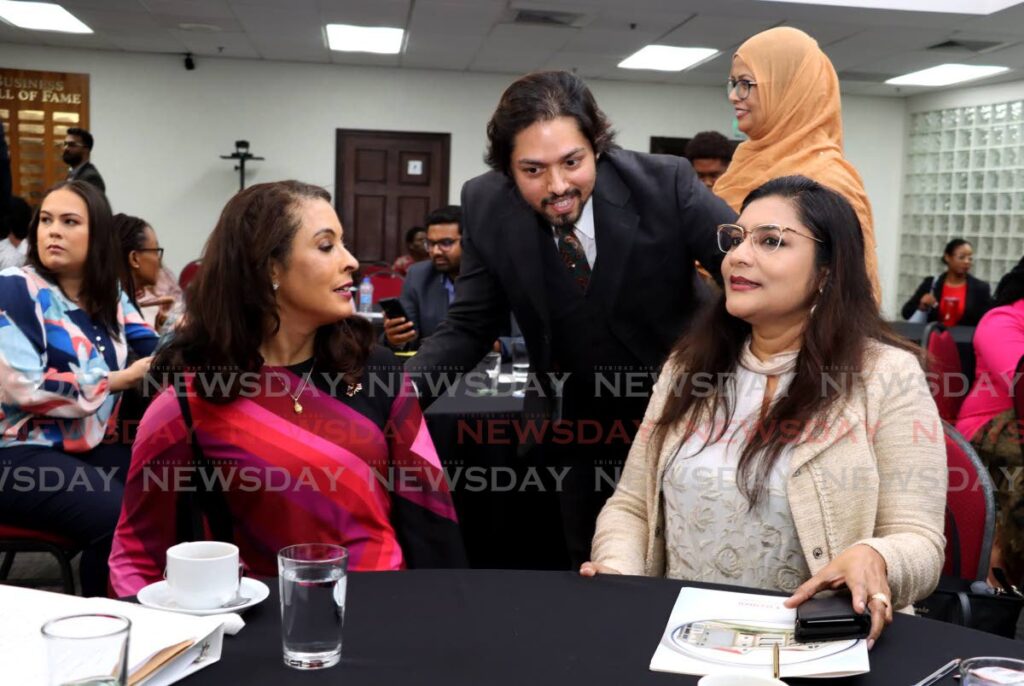Marginalised groups meet private sector to discuss inclusion

Over 120 private sector companies are expected to attend Pride TT’s Second Annual Diversity, Equity and Inclusion (DEI) Conference, where business leaders are expected to meet with members of ten marginalised groups to discuss workplace inclusion.
Speaking at the opening of the conference on Thursday at the TT Chamber of Industry and Commerce, Westmoorings, chair of the Chamber’s environmental and social governance committee and Pride TT co-founder Rudolph Hanamji said the conversations between the HR talent and the members of the groups would be facilitated by EY Caribbean.
Among the groups represented at the conference were QueerTT, the TT Occupational Therapy Association, the Transgender Coalition of TT, the Blind Welfare Association, the Downs Syndrome Family Network, The Women’s Caucus, Conflict Women, the Heroes Foundation, the TT Association for the Hearing Impaired, Pride United, and Caiso: Sex and Gender Justice.
US Ambassador Candace Bond said the Embassy was proud to partner with Pride TT on a six-month initiative called Towards a Just Society- Equal Access to Employment for LGBTQI+ Persons. The organisation received a US$5,000 grant toward their work.
“This project addresses hiring discrimination and lack of equitable workplace policies in public and private organisations across Trinidad and Tobago. Through this initiative, Pride TT has collected baseline data on access to employment and discriminatory practices experienced by lesbian, gay, bisexual, queer, intersex, and others (LGBT+) persons to develop a human resources training manual that will serve as the foundation for a three-day training programme for business leaders, HR professionals, and equal opportunity policy makers on establishing an inclusive DEI framework within their organisations.”
“This gathering is not just another conference, but a unique opportunity for leaders of business, human resource management professionals, and policy makers to engage in knowledge transfer of best practices to advance an equitable workplace for all people.”
Bond said the Equal Opportunities Act of TT does not explicitly include sexual orientation or gender identity in its mandate of protection, and she hoped the initiative would bring much-needed progress on addressing workplace inequities experienced by LGBTQI+ persons across TT.
“As leaders, when we establish workplace policies that give everyone equal access to opportunities, it sends a powerful message. It is also not enough to establish and adopt policies but to create an enabling environment for true inclusion.”
Among the groups represented at the conference were QueerTT, the TT Occupational Therapy Association, the Transgender Coalition of TT, the Blind Welfare Association, the Downs Syndrome Family Network, The Women’s Caucus, Conflict Women, the Heroes Foundation, the TT Association for the Hearing Impaired, Pride United, and Caiso: Sex and Gender Justice.
TT Chamber of Industry and Commerce president Kiran Maharaj said diversity did not only mean only gender, age, ethnicity, and physical ability, but also diversity in how people think.
“Equity refers to fair treatment for all people, differentiating it from equality, which assumes that all people should be treated the same. Equity takes into consideration a person’s unique circumstances, adjusting treatment accordingly so that the end result is equal.
“When we consider inclusion, I consider this giving voice to those who are on the journey with us as businesses and who help ensure our purpose is truly meaningful. It’s about embracing, engaging and exchanging thoughts, information, and more. But this is truly part of the empowerment process and builds an environment where leaders emerge and where there is greater opportunity for long-term success.”
Women’s Caucus founder Sharon Mottley shared the results of the research done using the grant. She said two questionnaires were created through the grant, one for employees and another for employers. She said the employee questionnaire was circulated online through various platforms, with 97 people responding. She noted while the employer questionnaire had been sent out to 300 companies through the Chamber, only five employers had responded.
Employees were asked their ages, orientations, whether they were male, female, non-binary, or other, whether they were out to their employers and coworkers, if their companies had diversity, equity, and inclusion policies, whether they had experienced or seen homophobic incidents at work, whether they felt safe reporting incidents, whether there were established ally groups, and whether people would change jobs if they knew they would be supported better
Hanamji said while the research undertaken centred around lesbian, gay, bisexual, queer, intersex, and others (LGBT+) people, there were intersections between many people of the marginalised groups.
He said the project would continue until October, with the policy being produced by December, and further training taking place. He said the hope was the example set by the private sector would have an effect on government policy.
“The idea behind this is that governments tend to move slowly. However, the private sector can do its own workplace policies outside of the existing legislation. As many know, the EOA is perhaps the only piece of legislation that actually does not include sexual orientation. It is a piece of legislation that excludes thousands of citizens. But we don't need legislation to do the type of work that is necessary to protect people.
“Our hope is that when the government realizes there is no pushback and the private sector is moving ahead, they will then react and do what is right to bring the legislation into place so that where there are instances of vulnerable people in workplaces that are not as progressive, they too will be protected, not just in certain companies.”
Hanamji said the study and policy built on and updated existing studies and projects such as Caiso’s workplace policy developed in 2021 and implemented by several companies.
The survey links can be found here: https://queertt.com/toward-a-just-society-pt-2/

Comments
"Marginalised groups meet private sector to discuss inclusion"